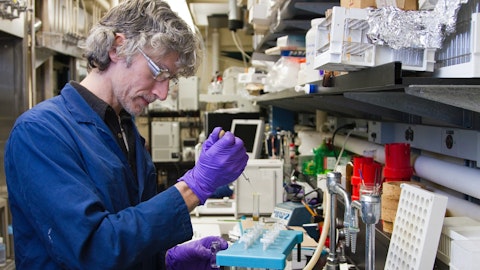Dr. Dean Li: So thank you very much for that question. I think it’s on — we will be — when we talk about starting 10 to 15 Phase 3 clinical trials, just in Oncology, this subcu program is a critical component to that and we will be starting those Phase 3 this year. What are we seeking to achieve? I have talked about the early cancer space. Early cancer space, I think, is really important just from a medical standpoint of where we can intact really the outcomes of patients. We can markedly improve that. If you are going to go in the early space, whether it’s neoadjuvant or adjuvant, from my clinical training, working with lung cancer doctors and oncologists, our ability to limit the need for individuals to constantly come to infusion centers is very important and we need to have the scientific innovation to do that.
In doing that, we have to think carefully about how do we give as much optionality to three weeks to six weeks in that subcu regimen and that’s what we are trying to drive through in our Phase 3 trials. Rob, did you want to answer anything else?
Rob Davis: No. I appreciate the question, Geoff. I think Dean covered it well. This is a very important part of our overall strategy as we think about moving into earlier lines of therapy and then to drive convenience and access for patients, which is very important. So it’s meaningful and it’s something we are going to pursue as fast as we can. Thanks, Geoff. Next question please, Kelly.
Operator: Next question comes from Mohit Bansal from Wells Fargo. Mohit, your line is open.
Mohit Bansal: Great. Thank you very much for taking my question. I think I have a big picture question regarding IO-IO combinations and the development strategies there, because the common criticism is that, many of these big Phase 3 studies were started with after less than robust Phase 2 data and that’s why they failed to show benefit in Phase 3. I mean looking at your data in Phase 2, they are single-arm data as well. So can you just help us understand what gives you confidence that this is the right strategy to move forward and wouldn’t it be better to do some kind of Phase 2 trial where you are — you have pembro as a control? Thank you.
Dr. Dean Li: Yeah. Thank you very much. I will just emphasize that as a general rule the way that I have begun to develop my view of IO-IO strategies, is that IO-IO strategies are very important to pursue. I think that IO-IO strategies plus other therapies that kill cancers may be especially important in the metastatic, but IO-IO strategies in the early stage could be quite impactful. And so, as I have just said, we have advanced our IO-IO strategy. We have advanced it with TIGIT CTLA-4 and LAG-3, so another component part. But I would just say this, I don’t know that there’s one single addition to KEYTRUDA that will have the breadth of KEYTRUDA. So we have been a little bit selective there and I think the movement of IO-IO, not just in the metastatic space, but especially in the early space will become important.
And the ability to do that requires your first IO of that IO-IO to be approved in the early space and that is why we are so excited about moving into earlier spaces with KEYTRUDA, because that allows us to execute in an IO-IO strategy in early-stage cancers.
Rob Davis: Thanks, Mohit. Next question please, Kelly.





